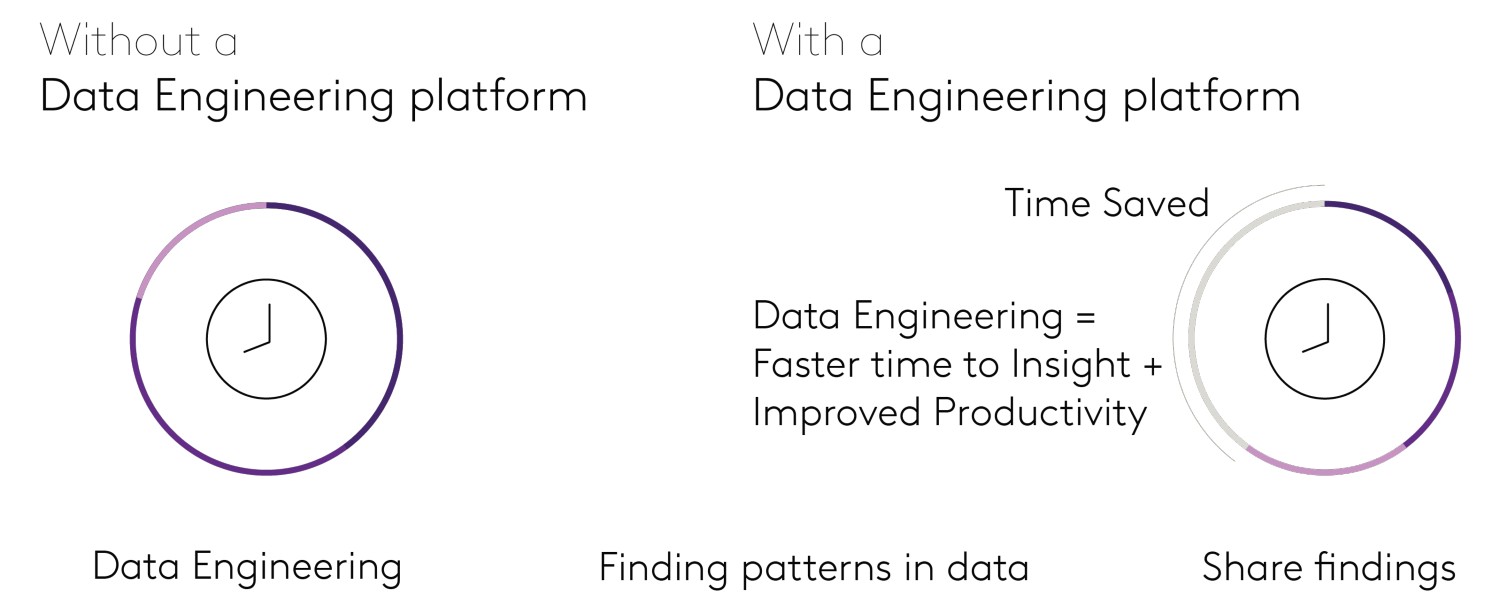In today’s business environment, it is a priority for organisations to make robust business decisions using all available data at their disposal. To make these decisions, often a key challenge is the time it takes to go from data to insight. Data Engineering tools help teams get to insights faster and ensure that the data has a voice at the table. Even though the value seems clear, organisations continue to face multiple barriers, such as:
- Connecting disparate marketing data sources is difficult.
- Solutions don’t have the flexibility to ‘fit-in’ with wider business objectives or existing technology frameworks.
- Most solutions focus on data preparation vs. data enrichment (e.g., anomaly detection and outlier treatment).
- Many solutions generate outputs that are often not ready for further consumption in advanced analytics or dashboarding platforms.
According to Gartner, by 2022 data preparation will become a critical capability in more than 60% of data integration, analytics/BI, data science and data lake enablement platforms. Data preparation will be utilised in more than 70% of new data integration projects for analytics and data science.

By 2024, machine-learning-augmented data preparation, data catalogues, data unification and data quality tools will converge into a consolidated modern enterprise information management platform used for the majority of new analytics projects.
Key considerations that drive platform choice
When evaluating technology platforms, be sure they can handle various types of marketing data and cater to a wide variety of stakeholders.
- Business Analysts can use for data cleansing, identifying inconsistencies and creating structured data. Harmonised data can be used for further reporting, business analysis, and connection to visualisation applications.
- Marketing Consultants can integrate data from multiple sources in one file. They can achieve faster insight generation by reorganising and summarising data from across sources.
- Market Researchers can handle specific tasks on survey data, like managing weighting schemes and brand inclusions/exclusions. They can also reduce manual effort on data processing.
- Data Scientists can detect anomalies in data, treating outliers and actions like missing value imputation. Enriched data can be used for creating advanced analytical models.
- Also choose a platform that is future proof. Leverage the benefits of AI to tackle data quality, integration and harmonisation challenges providing you with modernised flexibility, intelligence at scale and a system that is data supplier agnostic.
How clients are doing it right
Powerful examples, with clear business impacts, from some of our clients:
Pricing scenario workbench for a retail major
One of the largest warehouse club format retailers wanted to create a tool that could help analyse product pricing in comparison to its competitors. They wanted a tool that recommended pricing and ran different scenarios to view its impact on profitability. With the power of data engineering, the warehouse club now has a single source of truth for all pricing related information. There was a 75% reduction in time taken between ‘decision’ to ‘action’. 10,000+ man hours were saved on pricing executions and 70% of overall cost savings in making pricing decisions was achieved.
Revenue reporting dashboard for a hotel group
A leading international hospitality group wanted to create a completely automated performance evaluation engine for ancillary products monthly. Existing manual reports helped track revenue, but they were fragmented, effort-intensive and contained multiple data sources. The group wanted a self-service platform that would allow them to slice and dice data, and assess cross-program impacts. The dashboard delivered summarised outputs for senior management, enabling faster decision making. 80+ recurring reports were made redundant by creating an interactive and automated digital platform.
Automated harmonisation process for a non-alcoholic beverage company
A global non-alcoholic beverage brand wanted to build a ‘One-Stop Solution’ to access and analyse category data for 28 markets. This data was being sourced from four different vendors with different reporting formats. There were several challenges as there was no single platform available with the flexibility to cut the data as required and find answers to business questions easily.
The tool harmonised and consolidated data from multiple sources and made all of it available in a single portal. It provided a quick and easy visualisation of business performance and allowed users to slice and dice data for analysis. The tool has become the go-to portal for retail sales performance data and diagnostics for over 150 users across the organisation.
About Data Engineering powered by Olympus
Our cutting-edge solution infuses AI/ML frameworks with Kantar’s unique human and business understanding to provide end-to-end management of complex marketing data with ease, allowing you to focus on creating insights that can be put into action across the organisation.
Get in touch with our Kantar analytics data engineering experts.
Watch our video and learn how we can help you make your data journey more powerful today.

